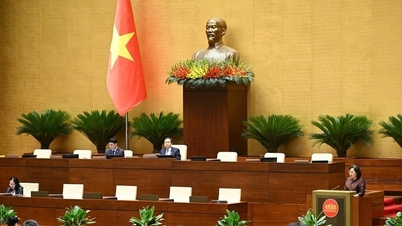According to the Law, credit institutions that are allowed to intervene early (when accumulated losses are more than 50% of charter capital) will be supported by many measures.
The Law on Credit Institutions (amended) has just been signed and certified by National Assembly Chairman Vuong Dinh Hue.
According to the law, credit institutions are allowed to intervene early (when accumulated losses exceed 50% of charter capital) and are supported by a number of measures such as: changing the calculation of risk reserves to the maximum difference between the credit institution's revenues and expenditures in the year. At the same time, the actual reserves and the difference with this maximum must be explained in detail in the financial statements.
The management of troubled banks must take responsibility for the consequences and minimize moral hazard in the banking system, not using government or other bank resources to solve the difficulties. The State Bank still ensures to prevent the risk of mass withdrawals.
Regarding the situation of cross-ownership and domination of credit institutions, this is one of the controversial issues in recent times. To minimize this situation, the Law on Credit Institutions (amended) has provisions on reducing the shareholding ratio of major shareholders; reducing the credit limit for a customer and related persons compared to the provisions in the Law on Credit Institutions 2010.
Specifically, the new ownership ceiling at a bank is as follows: individuals own a maximum of 5% of charter capital (unchanged); organizations 10%; shareholders and related persons 15%; major shareholders and related persons cannot own more than 5% of another credit institution.
The new credit limit regulation will reduce credit limits for customers and related parties. However, the change will be phased in over 5 years.
Regarding the handling of secured assets (effective from January 1, 2025), credit institutions are entitled to transfer part or all of the secured assets of real estate projects to recover debt.
This regulation is expected to help banks have more options to handle large projects with a small part of them being stuck in legal issues, thereby helping to unblock the cash flow of real estate businesses and reduce bad debt for banks, especially listed banks with a high real estate lending rate.
However, the law passed this time did not mention the right to seize collateral of credit institutions.
MR. PHUONG
Source
































































![[VIDEO] 50 years of Petrovietnam: Keeping the legacy alive, creating national energy](https://vphoto.vietnam.vn/thumb/402x226/vietnam/resource/IMAGE/2025/9/20/dff4ddb3d15a4076ba5f67fcdc6c7189)








































Comment (0)